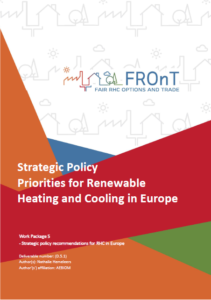Click here to download the paper
The FROnT project is publishing today a paper with strategic policy recommendations to support the deployment of renewable heating and cooling technologies (RES-HC). It starts with analysing the main barriers that are currently hampering the deployment of renewable heating and cooling technologies and proposes a set of policy recommendations for EU, national and local policy-makers to overcome these barriers.
The heating and cooling sector represents almost 50% of our energy consumption and is therefore key to decarbonise our entire energy system. RES-HC such as geothermal, solar thermal, biomass and heat pumps are today mature and available options to replace fossil fuels. However, important barriers remain, and multiple policy instruments are necessary for addressing the impediments that are preventing the uptake of renewable energy technologies.
On the consumers’ side, the main barriers to RES-HC deployment are the lack of awareness on available renewable solutions and financing difficulties in the face of an often higher initial investment cost compared to fossil installations. On the manufacturers’ side, the major barriers encountered are unfair market conditions and the lack of a stable and coherent supportive policy framework.
Therefore, in order to support the deployment of RES-HC solutions, two important things are needed:
- A stable and coherent legislative framework. Stability over years will ensure investors’ confidence while coherence will guarantee climate and energy objectives are met in a most cost-effective and straightforward manner. Policies aiming at supporting RES-HC solutions are needed in markets where the negative externalities of fossil fuels are not internalized and the carbon not (or not enough) priced.
- Technology and market specific support schemes. EU markets and RES technologies have different maturity levels. Therefore, a one-size-fits-all approach would not address the specificities of each technology or market and would jeopardise developing the right range of RES technologies needed to decarbonise completely our energy system. In a market still dominated by subsidies to fossil fuels, effective support schemes to RES are needed to increase their competitiveness and accelerate their deployment.
The paper also emphasises on the importance of the building sector, representing almost 30% of EU total energy consumption, to decarbonise the energy system and gives recommendations to foster a switch to RES heating appliances in existing and new buildings. It stresses the importance of architects and installers in increasing awareness among final consumers.
In addition, the paper highlights the necessity to develop long-term decarbonisation roadmaps, with clear and coherent national plans and milestones for 2030 and 2050.





